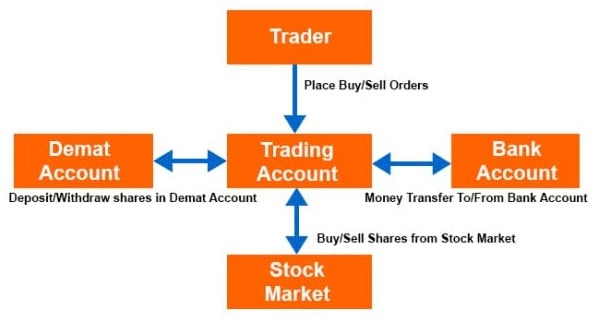 Zerodha (Trading & Demat Account)
Zerodha (Trading & Demat Account)
FREE Equity Delivery and MF
Flat ₹20/trade Intra-day/F&O
 Zerodha (Trading & Demat Account)
Zerodha (Trading & Demat Account)
FREE Equity Delivery and MF
Flat ₹20/trade Intra-day/F&O

|
|
An NRI Trading Account allows Non-Resident Indians to invest/trade online in Stocks, Stock Derivatives, IPOs, Mutual Funds, and Bonds at Indian stock exchanges i.e. BSE and NSE.
Zerodha (Flat Rs 20 Per Trade)
Invest brokerage-free Equity Delivery and Direct Mutual Funds (truly no brokerage). Pay flat Rs 20 per trade for Intra-day and F&O. Open Instant Account and start trading today.
An NRI Trading Account allows on-Resident Indians (NRIs) to invest/trade online in Stocks, Stock Derivatives, IPOs, Mutual Funds, and Bonds at Indian stock exchanges i.e. BSE and NSE. This account is a must for NRIs looking to invest in the stock market listed companies in India.
In addition to the NRI Trading Account, an NRI also need an NRI Bank Account and NRI Demat Account to invest in Indian Stock Market.
As per the government regulations, NRIs are only permitted to invest/trade in equity, and Currency Derivatives (through Authroised Dealer Category I Bank). They are not permitted to trade in Commodity derivatives. NRIs can do intraday trading in Equity and Equity F&O using the NRO Non-PIS trading account.
An NRI Trading Account can be opened with a stock broker like Zerodha, ICICI Direct, and HDFC Securities for online trading. Each trading account has a unique trading ID, which is used for conducting transactions.
The trading account facilitates the online stock market investments. It is in the middle of all the stock market transactions performed between a Bank Account, a Demat Account, Stock Exchange and the NRI investor, as shown in the below diagram.

Note: In Equity Derivatives trading, the broker sends the contract note to the Custodian, who settles the trade on behalf of the customer.
NRI trading account are classified into 2 types:
An NRI 3-in-1 account is an integrated account combining of 3 accounts; an NRI Trading Account, an NRI Demat Account, and an NRI Bank Account. Some brokers also call it NRI 4-in-1 account as they open 2 bank accounts; PIS and Non-PIS bank account.
Read NRI 3-in-1 account and PIS Account to know about it in detail.
The 3-in-1 account offers the most convenient way to invest in the Indian Stock Market. All the transactions between the 3 accounts are seamless and taken care by the bank offering the 3 in 1 account.
The 3-in-1 account is offered by the banks in India. This includes ICICI, HDFC, SBI, Axis Bank, Yes Bank, etc.
An NRI 2-in-1 account combines an NRI Trading Account and an NRI Demat Account. These accounts are mostly offered by brokers who don't have a banking license like ProStocks, Zerodha. NRIs need to open PIS, NRE & NRO savings bank accounts on their own before opening a 2-in-1 account.
Note; an NRI Trading Account is different from an NRI Demat Account. The trading account is meant for making trades in stock exchanges through a stock broker whereas a demat account is meant to hold securities bought in those trades in electronic form. In India, opening both the accounts is a must for trading in stock exchanges.

Answered on
An NRI Trading account is an account opened with a stock broker for trading or investment in Indian Stock Market.
An individual investor has to go through the stock broker for any transaction in stock exchanges (BSE and NSE). Stock brokers are registered member of the stock exchanges and work as an agent.
The trading account gives access to online investment in stock exchanges in India. An NRI can invest in various securities like stocks, equity Futures and Options, ETFs, and IPOs through the trading account.
An NRI trading account is linked with:
An NRI Trading and Demat Account have various fees and taxes associated with it. This includes account opening fees, brokerage charges, STT, Exchange Transaction Charges, SEBI Fee, Stamp Duty, and GST.
NRI Trading Charges
It is a one-time fee paid at the time of opening the account. This fee varies from broker to broker like Zerodha charges Rs 500 whereas ICICI charges Rs 4000 as account opening fee.
Stockbrokers charge a brokerage fee for every transaction through them. This charge varies from broker to broker i.e. Zerodha charges Rs 200 per order whereas ICICI charges 0.50 % - 1.25% of the trade value as NRI brokerage fees.
Following are the tax/fee charged in addition to the brokerage charges:
Some brokers charge for add-on services like:
To open an NRI Trading account, you would need the following documents:
All the documents need to be self-attested and also be attested by any of the following- Indian Embassy/Consulate General / Notary Public / Any Court / Magistrate / Judge / Local Banker of the country where you are currently residing.
The ban list of stocks for NRI is available on the RBI website. Whenever NRI investments in a stock hit the ceiling limit of permissible investments, the stock is put under the ban list by RBI. Once a stock is put in the ban list, no further purchases are allowed by an NRI in that particular stock.
A trading account can be opened for NRI minor provided a broker is offering these services.
SEBI has issued FAQs in reference to Trading and Demat account for minor however it does not specifically mention anything about NRI minor. Thus it is left to the interpretation of the market participants whether to offer such services. Generally, a broker may not easily open a trading account for minor except for few select brokers like Prostock.
It is important to note that a minor cannot enter into a contract with the broker to purchase or sell the shares freely in the market. The sole purpose of a minor trading account should be to sale the shares acquired by minor either by way of IPO, inheritance, corporate action, off-market transfers under the following reason:
An NRI is allowed to invest in Exchange Traded Fund (ETF) in India on repatriation as well as non-repatriation basis.
Unlike an equity stock, an ETF is a basket of securities like stocks or bonds that invests in any industry sectors using various strategies. It is an investment fund/index fund being listed and traded on a stock exchange. An ETF has combined characteristics of a mutual fund and stock. An ETF can be traded just like a stock and its trading value is based on the value of its underlying assets.
An NRI will require an NRI trading account, Demat account, and bank account to invest in ETF just like in case of stock investments.
An NRI can trade and invest in index funds with his NRI trading, Demat, and Bank account.
An index fund is a type of exchange-traded fund or a mutual fund that invests in stocks that form an index like NSE Nifty, BSE Senses, etc. These funds replicate the portfolio of an index. These are passively managed funds with exposure to a broader market at a low cost.
An NRI is permitted to trade and invest in the Futures and Options (F&O) segment in India, also popularly known as derivatives or Exchange Traded derivatives only on a non-repatriation basis.
An NRI does not require PIS approval to trade in the F&O segment and can trade using the NRO Non-PIS account.
NRI Requirements for trading in F&O:
Note: An NRI is generally required to keep minimum Rs. 25 lakhs as a deposit with the custodian. Thus, if a broker is offering F&O clearing services to NRI, then an NRI can save on this cost of keeping a deposit with the custodian. Currently, Prostock is one broker who clears and settles the trade for NRI.
An NRI is required to open an NRE PIS or NRO PIS/Non-PIS bank Account, trading account and Demat account to buy shares in India on repatriation or non-repatriation basis respectively.
The PIS approval is mandatory to trade on a repatriation basis. Thus, once an NRE PIS bank account is opened, an NRI is required to link this bank account with the NRE trading and Demat account. Once all these accounts are opened, set up and linked, an NRI can place a buy order with the broker on the arrangement of required funds in NRE PIS account.
An NRI is required to follow the exact same process to trade on non-repatriation basis except for the PIS approval which is optional if the broker is providing the service to trade without PIS and an NRI can place the order to buy shares through NRO trading account using funds from his NRO savings account to be held in NRO Demat account.
An NRI needs to take the delivery of the stock before placing a sell order as NRIs are not allowed to do short selling.
An NRI can sell shares in India only on the availability of the stock. An NRI cannot do short selling.
An NRI can sell the shares bought through the stock exchange in the capacity of NRI through NRE PIS/NRO PIS or Non-PIS accounts or as a resident Indian or shares received as a gift, bonus or rights issue or shares allotted in IPO.
To sell the shares bought in the capacity of resident Indian, an NRI is required to first transfer the shares to NRO Demat account from the resident Demat account.
The proceeds of stock bought on the repatriation basis are credited to the NRE bank account and that bought/acquired on a non-repatriation basis is credited to NRO bank account post deduction of TDS.

Add a public comment...

FREE Intraday Trading (Eq, F&O)
Flat ₹20 Per Trade in F&O
|
|